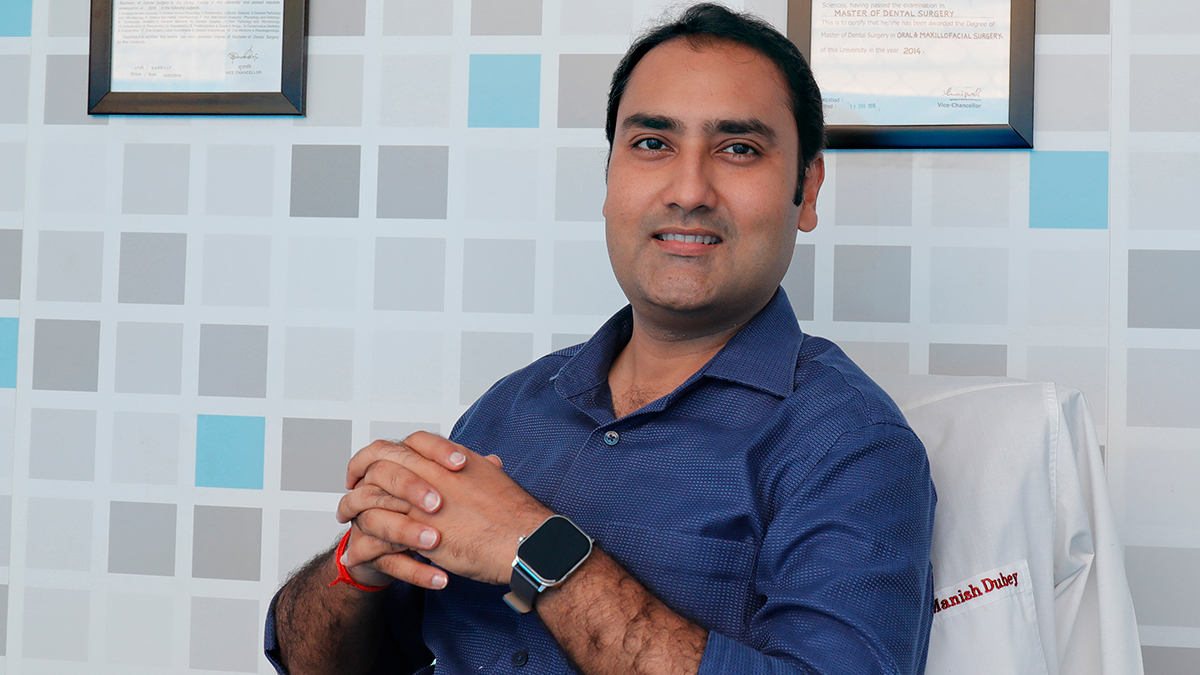Understanding oral health: This is a state of wellbeing of teeth, gums and other structures within our oral cavity or mouth that help in proper eating, speaking and aesthetics. While dental health just denotes healthy teeth and gums, overall state of oral health encompasses maintenance of oral cavity, its structures, their functions and also facial features and aesthetics. So good oral health is when all the components of the oral cavity like teeth, gums, periodontium (tissues that support and surround the teeth) are functioning properly and in harmony with each other, supporting not just eating but also helping in digestion and maintaining proper alignment of facial features.
Proper brushing: Brush for two minutes with adequate (not excessive) pressure; just enough to remove the plaque build-up. Rigorous brushing harms teeth in the long run. Hold the brush at a 45 degree angle, move it in small circular motions and cover all surfaces. Wait for 30-40 minutes after brushing before eating or drinking anything. Some people tend to brush after every meal but do that only if you have had garlic/onion or anything that gives you bad breath. Else brushing twice a day is fine.
Manual or electronic brushes? Both are fine as long as brushing technique and pressure are proper.
What about mouthwash? It is not a necessity. It does complement your brushing, but, if your oral hygiene is good, skip it unless advised by your dentist.
The neglect of flossing: Dental health overall is neglected in India. It is not just about flossing. People find it a waste of time that there should be an added step to their oral hygiene routine. But it is highly recommended as a brush cannot reach between teeth and cleaning that area is important too. Flossing is technique dependent, so one needs to learn to do it correctly.
White is not best: Normal teeth colour ranges from off-white to light yellowish. Sparkly, absolutely white teeth are not necessarily a sign of health. You can have healthy teeth even when your teeth appear a little yellow. Teeth colour tends to darken with age and habits.
Charcoal, bleach and other teeth ‘whiteners’: People tend to run after shiny, bright things. Charcoal is an added abrasive that harms the teeth in the long run. Similarly, DIY bleach can lead to severe sensitivity in teeth when done without supervision and without your dentist’s advice. If you want bleaching, go to your dentist.
 Shutterstock
Shutterstock
Traditional cleaners like ‘neem’ twigs: They are still popular in many regions. Though neem offers many benefits, for oral hygiene, it is imperative to use a proper brush as neem twigs can lead to abrasion of the top layer of teeth which leads to sensitivity. Moreover, these do not provide complete cleaning of the dental structures.
Pay attention to the gums: Maintaining proper oral hygiene, use of a brush with soft bristles, massaging the gums with your fingers after brushing, getting professional cleaning and a visit to your dentist will maintain good gum health.
Clean that tongue too: People often neglect tongue cleaning. Bacteria and food particles stuck over the tongue cause inflammation and bad breath. Prolonged negligence causes glossitis (inflamed and swollen tongue). Avoid vigorous cleaning of tongue especially with metal tongue cleaners, which may damage the taste buds present over the surface of the tongue. Use a soft tongue cleaner or brushes which have a cleaning surface on the back of their heads. Clean the extra deposit over the tongue with mild pressure.
Most common teeth problems: Dental caries is decay in tooth structures because of prolonged exposure to bacteria. Over time, the hard structures of your teeth (enamel and dentin) are damaged, gradually exposing pulp or nerve of teeth. Gingivitis is the swelling of gums. Periodontal disease comprises of inflammation and infection of tooth, gums and the surrounding structure.
What you drink and eat matters: Daily intake of tea, coffee, cold drinks and acidic beverages―over time all tend to erode the top layer of the teeth leading to sensitivity. GERD (acid reflux from stomach) too leads to erosion of teeth. It is also a myth that only sugar is the enemy. Sticky food substances like mayonnaise (and acidic substances) also harm the teeth. Even breathing through the mouth impacts oral health.
Self-examining your teeth: Thorough examination needs a dentist but one can look for deposition, any discolouration, caries, any pain or unnatural growth, bad breath, cracked tooth, mal-alignment and jaw pain. If you observe any of these, get examined at once.
Common among Indians: Periodontitis is highly prevalent in the Indian population. Oral cancer, because of growing use of tobacco is one of the leading cancers in our country. Dental caries is rising among young adults, primarily because of poor eating habits. They also exhibit last molar eruption pain. Children display early childhood caries. They also display mal-aligned teeth and retained primary teeth. Adults and senior citizens show prevalence of gum problems, cavities along with mobile and missing teeth.
Common visible mis-aligned teeth problems: Forwardly placed upper front teeth (proclined anteriors); labially/buccally erupted maxillary (eg. canine buried in your jawbone towards the side of your lip or cheek); anterior deep bites/closed bites (overlap of upper and lower teeth); posterior cross bites (back teeth not touching when one bites down); irregular arrangements of upper and lower front teeth; gummy smile and spacing in between front teeth. All these can be fixed by orthodontic treatment, including metallic/ceramic braces or clear aligners.
Ban the myths: Hard brushing is good for teeth. Scaling weakens the teeth. Tooth extraction leads to loss of eyesight. Only sugar causes caries. Milk teeth are not important.
Simple tips: Brush twice daily for two minutes with adequate light pressure. Visit your dentist regularly, and at once if you notice anything unusual. Be vigilant to any changes in your oral cavity. Have the sweets you love as long as you follow a proper brushing routine.
Not just the teeth: Oral examination can diagnose multiple systemic diseases like diabetes, vitamin deficiencies and adenoid hypertrophy (chronic mouth breathing) among others. Oral health not just impacts teeth but also our jaw and its musculature, our digestion and aesthetics as well. Diabetes causes weakened periodontal health and delayed wound healing and it also causes ketone (metallic) breath.
Not all of us will all lose our teeth: Many aged people have a full set of healthy teeth. You just need to take proper care of your teeth always and see your dentist. Yes, normal wear and tear happens like it does for all body parts.
More on the link with diet: Diet is an important factor as whatever we consume first needs to go through our mouth and teeth. So if you are having sugary, acidic food regularly, it not just leads to various health problems but also, over time, weakens the dental structures. It works vice versa, too. If you have weak/decayed/missing/mal-aligned teeth you can't chew or eat properly and that affects the quality of the food you intake and your overall health.
What’s new in the field? Use of Invisalign (clear aligners) to correct maligned teeth. Use of lasers for root canal treatment and gingival surgeries, TMJ pain (temporomandibular: the joint that connects the lower jaw to the skull), and for dental bleaching. Cone beam computed tomography (CBCT―a kind of medical imaging technique) to explore for any abnormality in jaw, bones and teeth. Use of Digital DC X-ray which emit far less radiation and of intraoral scanners to scan hard and soft tissues of the oral cavity.


